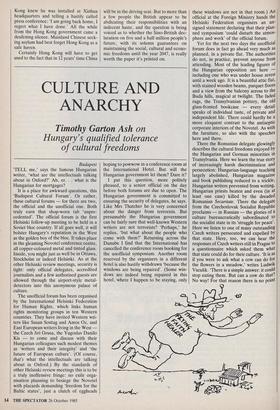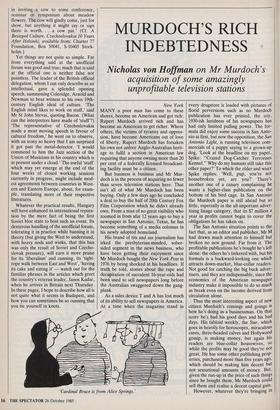CULTURE AND ANARCHY
Timothy Garton Ash on
Hungary's qualified tolerance of cultural freedoms
Budapest 'TELL me,' says the famous Hungarian writer, 'what are the intellectuals talking about in Oxford?' Ah, er. . . what is the Hungarian for mortgages?
It is a place for awkward questions, this `Budapest Cultural Forum'. Or rather, these cultural forums — for there are two, the official and the unofficial one. Both truly earn that shop-worn tab 'unpre- cedented'. The official forum is the first Helsinki follow-up meeting to be held in a Soviet bloc country. If all goes well, it will bolster Hungary's reputation in the West as the golden boy of the bloc. It takes place in the gleaming Novotel conference centre, all copper-coloured metal and tinted glass. Inside, you might just as well be in Ottawa, Stockholm or indeed Helsinki. As at the other Helsinki review meetings, security is tight: only official delegates, accredited journalists and a few authorised guests are allowed through the airport-style metal- detectors into this anonymous palace of culture.
The unofficial forum has been organised by the International Helsinki Federation for Human Rights, which links human rights monitoring groups in ten Western countries. They have invited Western wri- ters like Susan Sontag and Amos Oz, and East European writers living in the West the Czech Jiri Grusa, the Yugoslav Danilo Kis — to come and discuss with their Hungarian colleagues such modest themes as 'writers and their integrity' and 'the future of European culture'. (Of course, that's what the intellectuals are talking about in Oxford.) By the standards of other Helsinki review meetings this is to be a truly inoffensive fringe: no exile orga- nisation planning to besiege the Novotel with placards demanding 'freedom for the Baltic states', just a clutch of eggheads hoping to powwow in a conference room at the International Hotel. But will the Hungarian government let them? Dare it?
I put this question, more politely phrased, to a senior official on the day before both forums are due to open. The Hungarian government is committed to ensuring the security of delegates, he says. Like Mrs Thatcher he is very concerned about the danger from terrorists. But presumably the Hungarian government can be fairly sure that well-known Western writers are not terrorists? 'Perhaps,' he replies, 'but what about the people who come with them?' Returning across the Danube I find that the International has cancelled the conference room booking for the unofficial symposium. Another room reserved by the organisers in a different hotel is also hastily withdrawn 'because the windows are being repaired'. (Some win- dows are indeed being repaired in this hotel, where I happen to be staying, only these windows are not in that room.) An official at the Foreign Ministry hands the Helsinki Federation organisers an un- signed statement declaring that their plan- ned symposium 'could disturb the atmos- phere and work' of the official forum. Yet for the next two days the unofficial forum does in fact go ahead very much as planned, in a private flat. The authorities do not, in practice, prevent anyone from attending. Most of the leading figures of the Hungarian opposition are here including one who was under house arrest until a week ago. It is a beautiful attic flat, with stained wooden beams, parquet floors and a view from the balcony across to the Buda hills, magical at twilight. The faded rugs, the Transylvanian pottery, the old glass-fronted bookcase — every detail speaks of individual taste, of private and independent life. There could hardly be a more eloquent contrast to the antiseptic corporate interiors of the Novotel. As with the furniture, so also with the speeches here and there.
There the Romanian delegate glowingly describes the cultural freedoms enjoyed by the Hungarian and German minorities in Transylvania. Here we learn the true story of increasingly harsh discrimination and persecution: Hungarian-language teaching largely abolished, Hungarian magazine and book publishing reduced to a trickle, Hungarian writers prevented from writing, Hungarian priests beaten and even (in at least one case) killed by the dreaded Romanian Securitate. There the delegate from the Czechoslovak Socialist Republic proclaims — in Russian — the glories of a culture bureaucratically subordinated to the socialist state in its 'struggle for peace'. Here we listen to one of many outstanding Czech writers persecuted and expelled by that state. Here, too, we can hear the responses of Czech writers still in Prague to a questionnaire which asked them what that state could do for their culture. 'It is as if you were to ask what a cow can do for the flowers in a meadow,' writes Ludwik Vaculik. 'There is a simple answer: it could stop eating them. But can a cow do that? No way! For that reason there is no point in inviting a cow to some conference, seminar or symposium about meadow flowers. The cow will gladly come, just for show, but anything it might say or sign there is worth. . . a cow pat.' (Cf. A Besieged Culture, Czechoslovakia 10 Years After Helsinki, available from: Charter 77 Foundation, Box 50041, S-10405 Stock- holm.) Yet things are not quite so simple. Far from everything said at the unofficial forum was good and true; much that is said at the official one is neither false nor pointless. The leader of the British official delegation, whom I can only describe as an intellectual, gave a splendid opening speech, summoning Coleridge, Arnold and Newman to bear witness to his own 19th- century English ideal of culture. 'The English mind likes to work on stuff,' said Mr St John Stevas, quoting Bacon. (What can the interpreters have made of `stuff'?) `The representative of Czechoslovakia made a most moving speech in favour of cultural freedom,' he went on to observe, with an irony so heavy that I am surprised it got past the metal-detector. 'I would commend to him the Jazz section of the Union of Musicians in his country which is at present under a cloud.' The useful 'stuf which may yet emerge at the end of the four weeks of closed working sessions currently in progress, might include mod- est agreements between countries in West- ern and Eastern Europe, about, for exam- ple, translating more of their respective literatures.
Whatever the practical results, Hungary will have enhanced its international reputa- tion by the mere fact of being the first Soviet bloc state to host such an event. Its dexterous handling of the unofficial forum, tolerating it in practice while banning it in theory (but giving the West to understand, with heavy nods and winks, that this ban was only the result of Soviet and Czecho- slovak pressure), will earn it more praise for its 'liberalism' and cunning, its 'tight- rope walk between East and West', 'having its cake and eating it' — watch out for the familiar phrases in the articles which greet the country's veteran leader, Janos Kadar, when he arrives in Britain next Thursday. In these pages, I hope to describe how all is not quite what it seems in Budapest, and how you can sometimes be so cunning that you tie yourself in knots.



























































 Previous page
Previous page